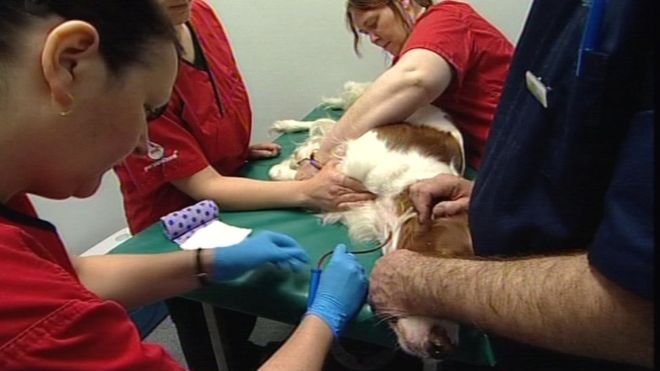Pet Blood Bank UK, a Loughborough-based charity, has teamed up with Petplan Charitable Trust (PPCT) to launch a mobile canine blood bank in Derbyshire. It is the first of its kind. Petplan Charitable Trust was set up in 1994. Its focus is to promote the health of animals. It has donated almost 11 million pounds in grants for the same. Pet Blood Bank was set up in 2007. The organisation has played a major role in the treatment of the dogs. It was the first to start the collection of blood from dogs.
The blood bank moves in a lorry. It has space that allows the dogs to undergo a check-up before donation. A dog donates about 450 ml of blood. The shelf life of red blood cells, separated from plasma in the blood, is increased by addition of red cell nutrient. Centrifuges are used for separation of plasma and red blood cells. Blood donated by a single dog can save the lives of four dogs.
Before the commencement of the mobile blood bank, sessions for blood collection from canines used to be held within veterinary practices by Pet Blood Bank. Blood would be stored at extremely cold temperatures before it would be transported to vets. In 2018, 3000 units were collected through these sessions, and 5000 blood products were made from 3000 units.
Mobility of canine blood bank helps in the collection of blood from areas which would otherwise have been inaccessible. According to Wendy Barnett, these blood banks will also help in holding blood donation sessions on short notice. DEA 1 Negative is the type of blood that is considered fit for donation therefore it can be tough to maintain the inventory. With increased access to even the most remote area it has gotten easier to collect the required blood type.
With the process of collection of blood simplified, sufficient availability of blood products 24 hours a day and 365 days a year can be ensured; this will save the lives of more dogs. Currently, blood collection sessions are held five times a week.
Before the commencement of mobile canine blood banks, blood donation sessions would be held by Pet Blood Bank five times a week at host practices; this limited the amount of blood that would be collected. With mobile blood banks, blood can be collected whenever the stocks are running low.
David Simpson, co-founder and chairman of the PPCT, hails the initiative. He feels that this initiative is highly helpful to sick dogs.
Pet Blood Bank aims to purchase more mobile banks in efforts to reach more areas as and when required. More blood banks will allow collection from areas where the service might be unavailable and ensure that vets do not run out of blood products at crucial moments. Pet Blood Bank further plans to launch a mobile blood bank service catering to cats’ health and welfare soon. Mobile blood banks will help in ensuring the good health of pets.





















